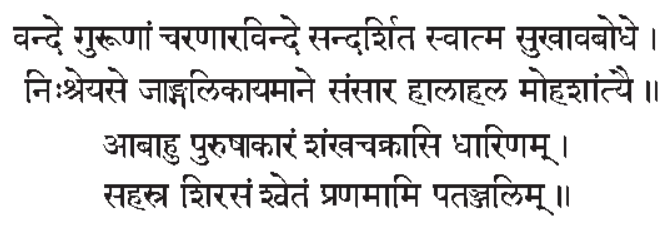Have you started practicing ashtanga yoga and do you want to learn the mantra with which every ashtanga yoga practice is started and ended? Or do you want to know more about what you are singing? That is what you can find here in this yoga blog.
Ashtanga yoga mantra
Opening mantra
ohm
vande gurūṇāṁ caraṇāravinde
sandarśita svātma sukhāvabodhe
niḥśreyase jāṅgalikāyamāne
saṁsāra hālāhala mohaśāntyai
ābāhu puruṣākāraṁ
śaṅkhacakrāsi dhāriṇam
sahasra śirasaṁ śvetaṁ
praṇamāmi patañjalim
ohm
Closing mantra ashtanga yoga
ohm
Svasti prajābhyaḥ
paripālayantāṁ nyāyena mārgeṇa mahīṁ mahīśāḥ
gobrāmaṇebhyaḥ śubhamastu nityaṁ
lokāḥ samastāḥ sukhino bhavantu
ohm śāntiḥ śāntiḥ śāntiḥ
Translation mantra
Because you may also like to know what you are singing (and most people don’t understand Sanskrit yet), I have also included the English translation of the mantra according to KPJAYI (Shri K Pattabhi Jois Ashtanga Yoga Institute). However, take in mind that to truly understand what it is about, a long study of Sanskrit, the yoga sutra and yoga philosophy is required. Fortunately, the sounds and vibrations of the mantra also do their work without you knowing exactly what is being sung.
Translation ashtanga yoga opening mantra
I bow to the lotus feet of Gurus
The awakening happiness of one’s own Self-revealed,
Beyond better, acting like the Jungle physician,
Pacifying delusion, the poison of Samsara.
Taking the form of a man to the shoulders,
Holding a conch, a discus, and a sword,
One thousand heads white,
To Patanjali, I salute.
Translation ashtanga yoga closing mantra
May all be well with mankind.
May the leaders of the earth protect in every way by keeping to the right path.
May there be goodness for all those who know the earth to be sacred.
May all the worlds be happy.
What is the purpose of singing the mantras?
The singing of the mantras help me to remind myself that it is not about the yoga postures themselves (which I am going to practice at that moment). To be grateful that the knowledge of yoga has been passed on for so long and that I can become more and more familiar with it.
It helps me to have discipline in my yoga practice, as well as to listen carefully to what my body indicates. To feel connected with my teachers and with myself. With devotion and surrendering instead of whether I 'feel' like it to do my practice or to worry about the results. And above all, this ritual creates a moment whereby I ask for guidance to be able to align to the subtle knowledge of yoga in the universe.
Hereby the microcosm of our body helps us to understand the macrocosm (as below so above, as above so below). Making it easier to let go of illusions and to get to know our true Self. Because yoga does not only help with physical pain, but it is also about healing and avoiding the pain caused by mental and emotional behavioral patterns. And then to take all of this with us during the rest of the day. With a feeling of gratitude.
How the mantras help you can of course be different. I would love it if you leave a comment at the bottom of the blog how the mantras help you, to get a more complete overview.
Mantra in Sanskrit alphabet


Also the yoga sutra can be used as mantra. Read about it HERE.
Enjoy your Habits© today with love and light!
Aimée Kuntz
Never ever again miss anything from our yoga blog?
Do you want to implement more yoga lifestyle habits, step by step? To become more relax and create & enjoy your ideal life by heart? To live according to your intention? Your pursuit of happiness? It is our goal to help you with this.
SIGN UP FOR OUR NEWSLETTER and never again miss any of our yoga blogs again.



 BRAND
BRAND
 PRODUCTS
PRODUCTS
 SALE
SALE
 BOUNDLESS ENERGY
BOUNDLESS ENERGY
 YOGA & AYURVEDA
YOGA & AYURVEDA
 YOGA BLOG
YOGA BLOG









